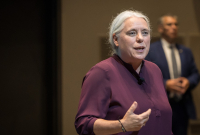Support strong Canadian climate journalism for 2025
A Coalition Avenir Quebec star candidate was forced to clarify his remarks on Sunday after a claim he that he'd witnessed political interference during his career as a police officer made waves on the Quebec campaign trail.
Ian Lafreniere, a longtime Montreal police spokesman, told TVA on Saturday that the thing he hated most about being a police officer was the "political interference" — though he did not go into details about the allegation at the time.
Faced with calls to explain himself, Lafreniere on Sunday cited the example of a 2014 call from former Montreal mayor Denis Coderre and the then-head of police, in which Coderre complained that the media had obtained information about a ticket he'd received.
"We're not talking about crimes, we're talking about small gestures that are important," he told reporters in Chambly, southeast of Montreal.
"Elected officials who call to ask who is talking to the media, what are the sources ... it's not me that invented it, and it led to a big investigation."
Lafreniere was referring to the Chamberland Commission, which was launched in 2016 after it was revealed that more than one police force had been spying on several Quebec journalists in an attempt to identify journalistic sources.
The final report, released late last year, called for better training for police officers, more rules to protect the police from political interference and better protection for all journalistic material, including sources.
"In my head, what I was referring to (in my remarks), very clearly, was Chamberland," Lafreniere said, adding he had not witnessed other examples of political interference.
Lafreniere's original TV interview drew swift reaction from the other parties, leading to some back-and-forth sniping on which party had the best plan to prevent corruption.
Several of the Coalition's rivals, including Liberal Leader Philippe Couillard, questioned why Lafreniere didn't come forward with his allegations when he was still a member of the force.
"I hope he will be able to detail what he said with specific facts, because normally he would have to denounce it if he was witness to that in his career," Couillard said Sunday morning as he campaigned in his home riding of Roberval.
Other candidates, including Liberal Marc Tanguay and Quebec solidaire co-spokesperson Gabriel Nadeau-Dubois, said the Coalitions's statements were hypocritical given their promise to review the nomination process for the heads of the province's police forces, including the anti-corruption squad, if elected.
"Basically, (Lafreniere) is telling us he's going to do political interference to solve the problem of political interference," Nadeau-Dubois said.
The Coalition's plan, reiterated by leader Francois Legault on Sunday, is to ensure the head of the anti-corruption unit, known as UPAC, would be confirmed through a two-thirds vote of the legislature in order to ensure neutrality.
Speaking in Vaudreuil, he noted that both the Parti Quebecois and Quebec solidaire have taken the same position.
"The only one who is not in agreement with that is Philippe Couillard and the Liberal Party," Legault said of the outgoing premier.
"So why do the Liberal Party want to choose the UPAC boss alone?"
Couillard shot back, saying the current system of having cabinet choose the head of UPAC was based on a recommendation from the Charbonneau Commission investigation into corruption in the construction industry.
Parti Quebecois Leader Jean-Francois Lisee, meanwhile, questioned Lafreniere's credibility and called on the candidate to provide proof of the serious accusations he made.
"I'm ready to believe it, but show it," he said at a campaign stop in Sept-Iles, in the Cote-Nord region of eastern Quebec.
Lafreniere rejected this criticism in his Sunday afternoon media appearance, noting he had spoken out by testifying before the journalistic sources commission.
The veteran police officer added he wouldn't take ethics lessons from "certain old parties" who might feel personally targeted by his remarks.
Also on Sunday, Legault brushed off criticisms over his party's decision to quietly drop the words "oil," "shale gas," and "birth rate" from the description of his platform on his party's website.
He said the reference to birth rate was removed to avoid giving ammunition to his rivals, who have described Legault's plan to increase funding for families with multiple children as a "baby bonus."
Any other wording changes, he said, were due to a long-planned reorganization of his party's website and not to criticism from his rivals, who have accused him of being "pro-oil."
"We wanted during the election campaign to change the look and be sure that the priorities are put in the right place, but I didn't see anywhere that our positions have changed," he said.
The two other main parties piled on Legault for the changes, accusing him of lacking conviction and trying to hide his real position from electors.
-- With files from Caroline St-Pierre in Vaudreuil-Dorion, Stephanie Marin in Sept-Iles, and Patrice Bergeron in Saint-Felicien, Que.





Comments